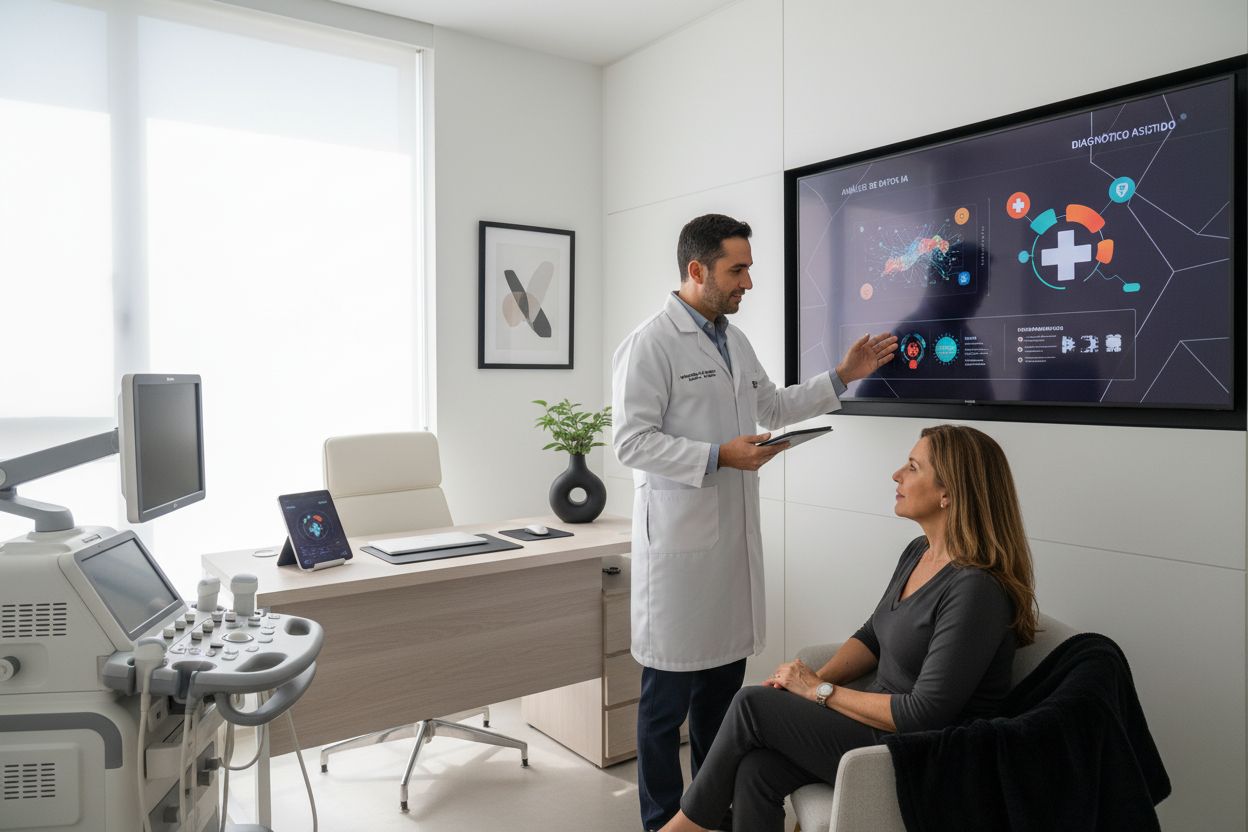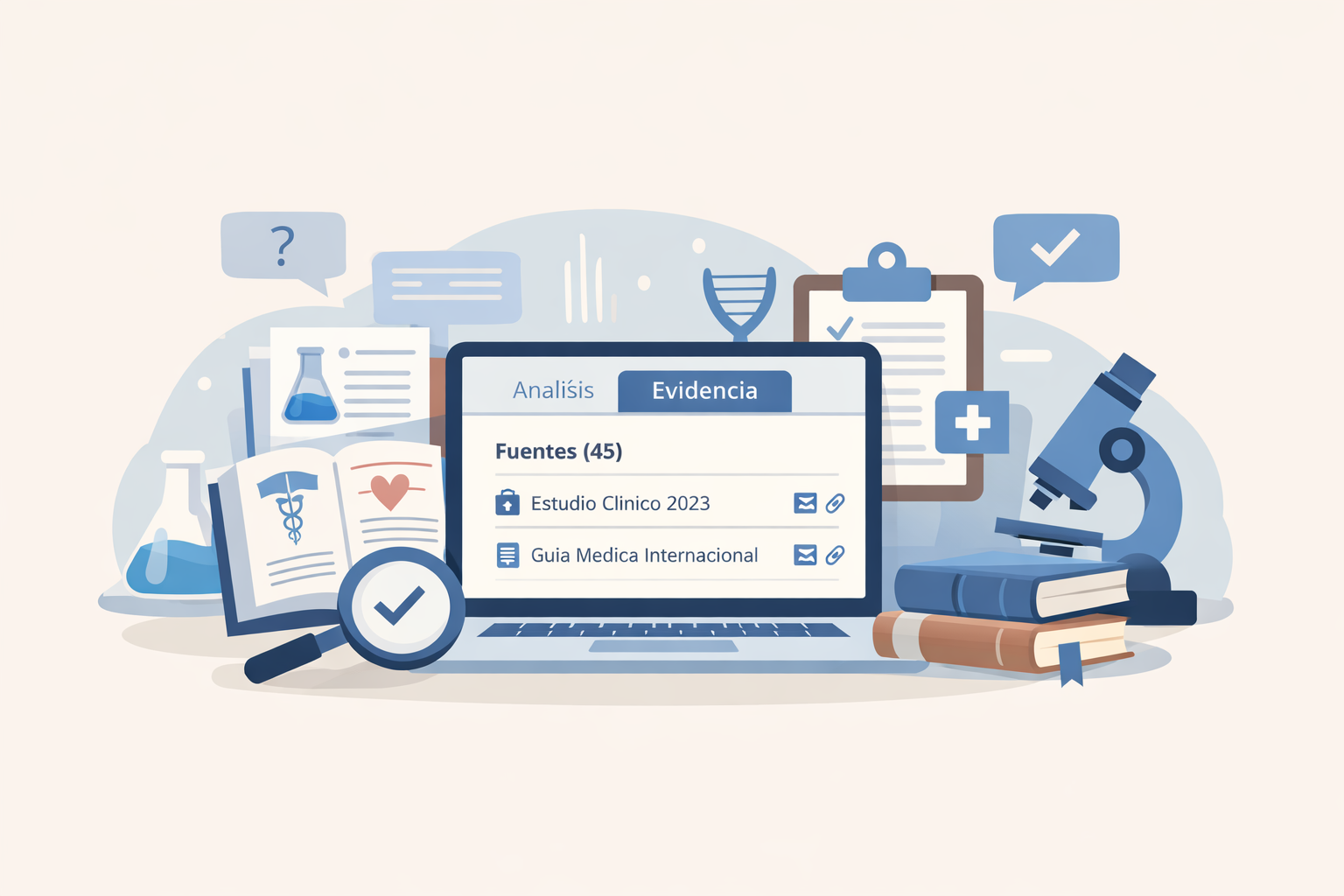Did you know that more than 80 % of hospitals worldwide are exploring artificial intelligence to improve their medical care? Integrating intelligent algorithms into practices transforms the way clinical information is diagnosed and managed. Understanding how medical AI empowers the work of the healthcare professional and what its practical applications are uncovers real opportunities to optimize accuracy, safety and personalization in patient care.
Key Points
| Point | Details |
|---|---|
| Augmented Intelligence | Medical AI acts as a complement, enhancing the capabilities of the professional without replacing him or her. |
| Automation in Documentation | The implementation of AI improves efficiency in clinical documentation management, enabling more patient-centered care. |
| Regulatory Challenges | The adoption of AI in Latin America faces obstacles such as limited infrastructure and lack of consistent regulations across countries. |
| Ethics and Supervision | It is crucial to maintain ethics in the use of AI, avoiding technological overdependence and ensuring oversight of results. |
Table of Contents
- Definition and key concepts of medical ia
- Main clinical applications in dental offices
- Advantages over traditional and laboratory solutions
- Privacy and data security in the clinic
- Regulatory and adoption challenges in latin america
- Common errors and practical recommendations
Definition and key concepts of medical AI
The medical artificial intelligence represents a technological system capable of mimicking advanced human intelligence functions in the healthcare context, using sophisticated algorithms that enable autonomous learning and real-time decision making. According to the Ithaca's guide to artificial intelligence in medicine, These systems can process large volumes of clinical information with unparalleled accuracy and speed.
The World Medical Association points out a key concept: “augmented intelligence”, which emphasizes that these systems do not replace the medical professional, but coexist with his or her decision-making capacity. Medical AI systems are characterized by:
- Continuous learning and algorithm adaptation
- Medical big data analysis capabilities
- Support in complex diagnostics
- Personalization of treatments
- Predictive risk assessment
In essence, medical AI does not seek to supplant the professional, but rather to enhance their capabilities, offering tools that improve diagnostic accuracy, optimize clinical processes and enable more personalized and efficient care.
Main clinical applications in dental offices
In today's clinical environment, the artificial intelligence is radically transforming daily medical practice, offering tools that significantly enhance diagnostic efficiency and accuracy. One revealing example is clinical documentation, where new functions to optimize patient consultations allow a more agile and accurate management of medical information.
According to recent research, there are fundamental applications of AI in practices, highlighting two main areas:
- Automated clinical documentation
- Automatic transcription of patient-physician interactions
- SOAP/BIRP note generation with natural language processing

- Significant reduction of documentation time
- Increased focus on direct patient care
- Computer-aided diagnostics
- Digital analysis of medical images
- Radiological interpretation with AI support
- Identification of subtle patterns imperceptible to the human eye
- Potential reduction of diagnostic errors
AI does not seek to replace the medical professional, but rather to be a technological ally that optimizes processes, improves precision and allows for more personalized and efficient care.
Advantages over traditional and laboratory solutions
The medical artificial intelligence represents a fundamental qualitative leap compared to traditional methods of diagnosis and analysis in the healthcare sector. While laboratory solutions offer static results, AI allows processing huge volumes of information in real time, generating personalized and dynamic recommendations. Build patient medical history automatically is just one example of how these technologies are transforming clinical practice.
According to recent research, the advantages of AI over traditional systems include:
The following is a comparison of the key advantages of medical AI over traditional methods:
| Feature | Medical AI | Traditional methods |
|---|---|---|
| Adaptability | Continuous learning Continuous improvement | Statics No self-improvement |
| Data processing | Big data in real time | Limited data Slow |
| Diagnostic customization | Specific recommendations per patient | General Protocols |
| Accuracy | High Reduction of human error | Menor More error prone |
| Speed | Instant results | Slow processes Manuals |
- Continuous adaptabilityAlgorithms are constantly learning and improving.
- Big data processingAnalysis of medical information at previously unthinkable scales.
- Diagnostic customizationSpecific recommendations for each patient
- Reduction of human error: Increased accuracy in data interpretation
- Processing speedInstant results vs. conventional methods

In essence, AI does not seek to replace the medical professional, but rather to enhance his or her capacity, offering tools that complement clinical judgment with accurate, rapid and contextualized information, allowing for more efficient and patient-centered care.
Privacy and data security in clinical AI
Medical data privacy represents one of the greatest challenges for the implementation of artificial intelligence in clinical environments. Recent research reveals critical vulnerabilities in today's systems, where the protection of sensitive information has become a top priority. Upload clinical files and let them integrate automatically exemplifies the need for solutions that guarantee the confidentiality of information.
Among the main security challenges in medical AI are:
- Reversible anonymizationTraditional techniques can be violated
- Regulatory gapsLack of uniform global standards
- Informed consent: Lack of clear protocols for the use of data
- Export risksTransfers between jurisdictions without regulation
An emerging solution is the federated learning, a technology that allows AI models to be trained without directly exposing sensitive data. This method retains information locally, sending only algorithm updates, which significantly reduces the risks of leakage or misuse of personal medical information.
Regulatory challenges and adoption in Latin America
The adoption of medical artificial intelligence in Latin America faces a complex panorama, marked by regulatory challenges and structural limitations. While some countries are making progress in regulatory frameworks, the region still lacks a homogeneous approach to integrating these technologies into the healthcare system. Understanding the differential diagnosis becomes crucial to navigate this scenario of technological transformation.
The main obstacles to the implementation of clinical AI include:
- Limited technological infrastructure
- Lack of interoperable data
- Shortage of specialized professionals
- Insufficient investment in medical technology
- Incomplete regulatory frameworks
It should be noted that only Peru has passed specific legislation, while countries such as Brazil and Mexico are timidly leading the way in terms of investment. The regulatory approach is characterized by being casuistic, adapted to local institutional realities and with a risk-based assessment model, a significant departure from the more rigid and centralized European frameworks. Effective adoption will depend on the ability to create ecosystems that balance innovation, safety and accessibility in medical practice.
Common errors and practical recommendations
The implementation of artificial intelligence in clinical settings requires a thorough understanding of its true capabilities and limitations. A fundamental mistake is to perceive AI as a replacement for the medical professional, when in fact it should be a technological ally. Uploading clinical records and letting them integrate automatically illustrates perfectly how technology should complement, not replace, clinical judgment.
The most frequent errors in the adoption of medical AI include:
- Overestimating capabilitiesBelieving that AI can completely replace medical judgment
- Neglecting ethics: Ignoring patient's rights and privacy
- Lack of supervisionAccepting system results without critical verification
- Inadequate trainingFailure to adequately train personnel in the use of AI tools
- Technological dependenceDelegating crucial decisions only to automated systems
The World Medical Association emphasizes that the true implementation of AI in medicine must focus on the augmented intelligenceThe key is to use these tools as an intelligent complement, not as a substitute for human judgment. The key is to use these tools as an intelligent complement, not as a substitute for human judgment.
Transform your practice with AI: take the next step in Latin America
Do you notice that clinical documentation and diagnostics consume valuable time with your patients? The concrete advances in Medical AI in the region confirm that automating processes is not just a trend, but a necessity to optimize your daily work. Find out how you can transform the same key areas we addressed in the article-documentation, diagnostic accuracy and data management-with tools designed especially for Latin American practices. See more practical solutions in our Specialized guides on medical AI.

Don't get left behind in the digital transformation of healthcare. Try now how to Itaca.ai can help you automate clinical notes, improve data security and personalize care for your patients. Get started today and bring efficiency and peace of mind to the heart of your practice. Ready to experience a more streamlined and secure workflow? Discover also the latest New features and functions in clinical AI to leap into the future.
FAQ
What is medical artificial intelligence?
Medical artificial intelligence is a technological system that mimics advanced functions of human intelligence in the healthcare setting, using algorithms that enable autonomous learning and real-time decision making.
What are the main applications of AI in medical practices?
Notable applications include automated clinical documentation and computer-aided diagnostics, which help optimize time to care and improve diagnostic accuracy.
What are the advantages of medical AI over traditional solutions?
Medical AI offers advantages such as continuous adaptability, real-time processing of large volumes of data, diagnostic personalization, high accuracy and speed in obtaining results.
What challenges does the implementation of AI in healthcare face?
The main challenges include limited technological infrastructure, lack of interoperable data, shortage of trained professionals and incomplete regulatory frameworks.





Leave a Reply